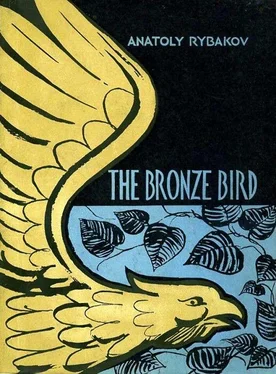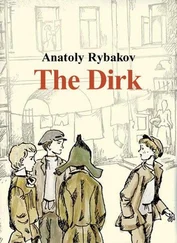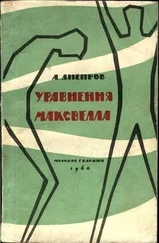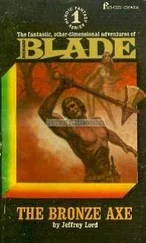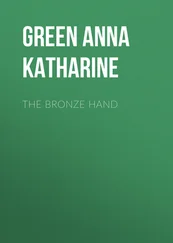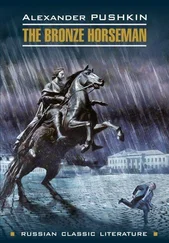Anatoly Rybakov - THE BRONZE BIRD
Здесь есть возможность читать онлайн «Anatoly Rybakov - THE BRONZE BIRD» весь текст электронной книги совершенно бесплатно (целиком полную версию без сокращений). В некоторых случаях можно слушать аудио, скачать через торрент в формате fb2 и присутствует краткое содержание. Город: Moscow, Год выпуска: 1956, Издательство: Foreign Languages Publishing House, Жанр: Детские приключения, Детектив, Исторические приключения, на английском языке. Описание произведения, (предисловие) а так же отзывы посетителей доступны на портале библиотеки ЛибКат.
- Название:THE BRONZE BIRD
- Автор:
- Издательство:Foreign Languages Publishing House
- Жанр:
- Год:1956
- Город:Moscow
- ISBN:нет данных
- Рейтинг книги:5 / 5. Голосов: 1
-
Избранное:Добавить в избранное
- Отзывы:
-
Ваша оценка:
- 100
- 1
- 2
- 3
- 4
- 5
THE BRONZE BIRD: краткое содержание, описание и аннотация
Предлагаем к чтению аннотацию, описание, краткое содержание или предисловие (зависит от того, что написал сам автор книги «THE BRONZE BIRD»). Если вы не нашли необходимую информацию о книге — напишите в комментариях, мы постараемся отыскать её.
THE BRONZE BIRD — читать онлайн бесплатно полную книгу (весь текст) целиком
Ниже представлен текст книги, разбитый по страницам. Система сохранения места последней прочитанной страницы, позволяет с удобством читать онлайн бесплатно книгу «THE BRONZE BIRD», без необходимости каждый раз заново искать на чём Вы остановились. Поставьте закладку, и сможете в любой момент перейти на страницу, на которой закончили чтение.
Интервал:
Закладка:
Anatoly Rybakov
THE BRONZE BIRD
____________________
Foreign Languages Publishing House
Moscow 1956
Translated from the Russian by David Skvirsky
____________________
CONTENTS
Part I. FUGITIVES
Part II. PURSUIT
Part III. GOLIGIN BRUSHWOOD ROAD
Part IV. MUSEUM OF REGIONAL STUDIES
Part V. THE SECRET OF THE BRONZE BIRD
Part I
FUGITIVES
Chapter I
THINGS YOU CAN'T FORESEE
Genka and Slava were sitting on the bank of the Utcha.
Genka, his red hair sticking out in all directions, his pants rolled up above his knees and the sleeves of his striped singlet above his elbows, was eyeing the tiny boat station with a disdainful expression on his face.
"Call this a station!" he said, dangling his feet in the water. "They stuck a life belt on a hen-coop and think they've got a station!"
Slava was silent. His pale face, with its slight, rosy tan, looked thoughtful. Chewing a blade of grass in a melancholy way, he was reflecting on a distressing thing that had happened in the camp.
Why did it have to happen just when he, Slava, had been left in charge? True, it was a duty he shared with Genka, but Genka never gave a hang for anything. Here he was dangling his feet in the water without a care in the world.
That indeed was exactly what he was doing.
"A station!" he commented. "Three broken-down tubs! I can't stand show-offs! And there's nothing to show off about! They should simply have written: 'boats for hire,' or 'landing.' That would have been modest and to the point. But 'station'!"
"I'm sure I don't know what we're going to say to Kolya," Slava sighed.
"What's there to say? We're not to blame. And if he starts lecturing I'm going to tell him straight, 'Look, Kolya, you've got to be objective. Nobody's to blame. Besides, life's full of things you can never foresee.'" And with a philosophical air he added, "Yes, life would not be worth while living without them."
"What are you talking about?"
"Things you can't foresee."
"You've got no sense of responsibility," Slava said, scanning the road leading from the railway station.
"'Sense,' 'responsibility'!" Genka said with a contemptuous wave of his hand. "Beautiful words... Everyone answers for himself. Back in Moscow I said we shouldn't take any Young Pioneers to camp with us. I warned them, didn't I? But nobody listened."
"It's no use talking to you," Slava replied indifferently.
For some time they sat in silence, Genka dangling his feet in the water and Slava chewing his blade of grass.
It was baking hot in the July sun. A grasshopper was chirping tirelessly in the grass. The river, narrow and deep and hidden in the shadow of the shrubbery overhanging its banks, wound its way through fields, hugged the foot of the hills, carefully skirted round the villages and disappeared in the forest, hushed, dark and cool.
The wind brought the sounds of a rural street from a village nestling at the foot of a mountain in the distance. The village looked like a haphazard heap of iron, plank and thatched roofs lying amidst the greenery of orchards. Near the stream, by the ferry, the bank was criss-crossed by a dense network of footpaths.
Slava kept his eyes on the road. The Moscow train had probably arrived and Kolya Sevastyanov and Misha Polyakov would be here any minute. Slava sighed.
"Sighing?" Genka smirked. "Those ohs and ahs! How many times have I told you..."
"There they are!" Slava rose, shading his eyes with his hand.
Genka stopped dangling his feet and climbed to the top of the bank.
"Where? Hm. It's them all right. Misha's in front. Behind him... No, it's not Kolya. Some chap or other. It's Korovin! 'Pon my word, it's Korovin, remember the chap who was a waif? And he's got a sack on his shoulders."
"Books, probably."
The boys gazed intently at the small figures moving up the narrow path across the fields. And although they were still far away, Genka spoke in a whisper:
"Only bear in mind, Slava, I'll do all the talking. Don't interfere or you'll spoil everything. I'll pull it off, don't you worry. Especially as Kolya hasn't come. What's Misha? I know how to handle him even if he is the assistant leader."
For all his bravado, Genka felt decidedly uncomfortable. There was an unpleasant talk ahead.
Chapter 2
UNPLEASANT TALK
Misha and Korovin put the sacks down on the ground.
"Why are you here?" Misha demanded.
He was in a dark blue cap and a leather jerkin, which he wore even in summer, believing that it made him look like a real Komsomol activist.
"Just like that." Genka felt the sacks. "Books?"
"Yes."
"Where's Kolya?"
"He won't be coming. He's been called up. He's going to the Navy."
"I see," Genka drawled. "Who are they sending instead?"
Misha did not reply at once. He took off his cap and smoothed his black hair.
"Who are they sending?" Genka asked again.
Misha did not reply at once because he had been appointed leader of the troop and did not know how to break this news to his friends in a way that would preclude their thinking he was putting on airs and make them immediately accept him as their leader. It was not easy to give orders to fellows you shared the same desk with. On the way Misha had thought of a phrase or two which he hoped would help him out of the difficulty. Diffidently, with exaggerated nonchalance, he said:
"For the time being I've been put in charge."
He had placed great hopes on the phrase "for the time being." Indeed, who should temporarily substitute for a leader if not the second in command?
But the unassuming and shy "for the time being" did not make the impression he thought it would.
"You?" Genka said, goggling his eyes. "But what weight will we carry in the village? Everybody, even the old folk, had a high opinion of Kolya."
That forced Misha to draw upon the second of his prepared rescue phrases.
"I turned down the appointment, but the District Committee confirmed it." Feeling the authority that the mention of the District Committee gave him, he asked sternly, "Why did you leave the camp?"
"We left Zina Kruglova in charge," Genka put in hastily.
That, Misha told himself, was the fruit of a little sternness.
Slava, meanwhile, an apologetic tone in his voice, said:
"You see, Misha..."
But Genka cut him short:
"How are you, Korovin? Have you come to pay us a visit?"
"No, I'm here on business," Korovin replied, inhaling noisily through his nose. Thick-set, stocky, he looked fat and clumsy in his labour commune uniform. Beads of sweat shone on his face and he kept brushing the flies away with his hand.
"You've certainly put on weight at the commune," Genka noted.
"The food's pretty good," Korovin said in his artless way.
"What brings you here?"
Misha explained that the children's home where Korovin lived was being converted into a labour commune and that it was taking over the local manor and estate for the purpose. They were expecting the headmaster tomorrow. Korovin had been sent on ahead to make inquiries.
Out of modesty, Misha did not tell his friends that properly speaking this had been his idea. He had met Korovin in the street on the previous day and had learned from him that the children's home was looking for a place near Moscow in which to establish a labour commune. Misha said he knew of a place that he thought would be suitable. Their camp, he said, was in the former estate of Karagayevo. True, it was in Ryazan Gubernia, but that was not far from Moscow. The estate was untenanted. Nobody was living in the huge manor-house. Altogether it was a wonderful place, in fact the best that could be found for a commune. That same day Korovin had passed the information on to the headmaster, who told him to go with Misha, promising to follow on the next day.
Читать дальшеИнтервал:
Закладка:
Похожие книги на «THE BRONZE BIRD»
Представляем Вашему вниманию похожие книги на «THE BRONZE BIRD» списком для выбора. Мы отобрали схожую по названию и смыслу литературу в надежде предоставить читателям больше вариантов отыскать новые, интересные, ещё непрочитанные произведения.
Обсуждение, отзывы о книге «THE BRONZE BIRD» и просто собственные мнения читателей. Оставьте ваши комментарии, напишите, что Вы думаете о произведении, его смысле или главных героях. Укажите что конкретно понравилось, а что нет, и почему Вы так считаете.
